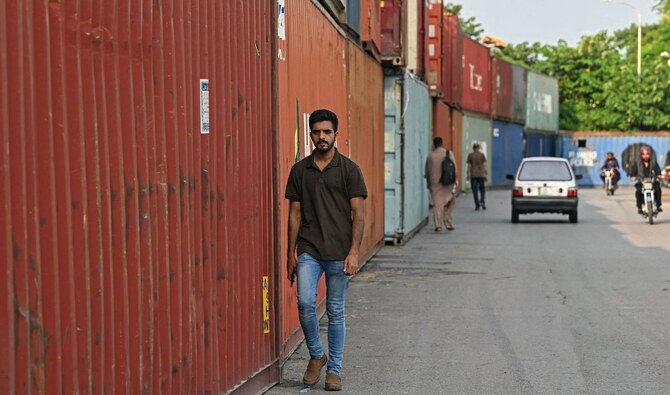ISLAMABAD: Many cities and towns in the Pakistani province of Punjab remained tense on Wednesday with heavy police deployment and road blockades as supporters of the opposition Pakistan Tehreek-e-Insaf (PTI) came out to protest constitutional amendments the party says are aimed at curtailing the independence of the judiciary.
The PTI of former prime minister Imran Khan had announced rallies in the cities of Bahawalpur, Faisalabad and Mianwali against the proposed constitutional amendments, which the ruling coalition of Premier Shehbaz Sharif denies are meant to suppress judicial independence.
In response to the protest calls, the Punjab home ministry imposed Section 144, a legal provision that allows a ban on the gathering of more than four people on account of security threats. The Home Department said political gatherings and rallies could provide a soft target to militants and were likely to cause “threat to public peace and order as well as inconvenience to public at large.”
Local media widely reported that various thoroughfares and arteries across Punjab had been cordoned off after Section 144 was imposed.
In Mianwali, Internet services were blocked city-wide and the PTI said police were “tear gas shelling peaceful protesters,” calling on the provincial chief minister and police not to attack “common citizens who are protesting as per their right!”
In a separate clip, a crowd of Khan supporters can be seen fleeing as tear gas shells are fired by police personnel. In another footage, Khan supporters can be seen chanting slogans during a motorcycle rally in Mianwali.
Major routes leading in and out of Bahawalpur were sealed, with containers placed at strategic locations such as the Qutubpur Toll Plaza and Mewati in Dunyapur, as well as at the Empress Bridge connecting the cities of Lodhran and Bahawalpur. Check posts had been erected on five main highways leading from Lodhran to Bahawalpur.
In Faisalabad, the PTI had announced they would hold a protest at Chowk Ghanta Ghar at 2pm but all roads leading to the venue were blocked off on Wednesday afternoon and there was heavy police deployment.
In a clip widely shared from Chowk Ghanta Ghar in Faisalabad, dozens of Khan supporters can be seen thrashing police officers who later break free and escape.
The exit and entry points of the city were also closed with shipping containers and eight major markets in Faisalabad were shut down and sealed with barbed wire.
Pakistani news channel Samaa reported police had conducted raids across Faisalabad, arresting over 200 PTI supporters, including some provincial legislators.
Despite the blockades and police deployment, the PTI said its supporters were going in large numbers to the designated venues of the protests.
Aun Abbas Bappi, the PTI president for South Punjab, called on people to come out and exercise their right to protest.
“This war is not just Imran Khan’s war,” he said in a message on X. “This war is my war and your children’s war so go out today with your families and children. Come out and record your peaceful protest.”
The PTI has challenged the imposition of Section 144 in the Lahore High Court (LHC), saying the government had banned gatherings to block PTI supporters from staging protests, which was a constitutional right.
PREVIOUS PROTESTS
The garrison city of Rawalpindi, bordering the federal capital of Islamabad, remained tense last Saturday as police fired tear gas shells to disperse hundreds of Khan supporters ahead of a protest in the city to demand the release of Khan, who has been in jail since August last year on multiple charges that he says are politically motivated to keep him and his party out of politics.
After a PTI rally in Islamabad on Sept. 8, over a dozen legislators from the party were arrested on charges of violating an agreement based on which permission for the gathering was issued, including abiding by a time limit and supporters sticking to certain routes to reach the designated venue for the rally on Islamabad’s outskirts.
Khan’s party says the challenges in holding rallies are part of an over-year-long crackdown it has faced since protesters allegedly linked to the party attacked and damaged government and military installations on May 9, 2023, after the former premier’s brief arrest the same day in a land graft case.
Hundreds of PTI followers and leaders were arrested following the riots and many remain behind bars as they await trial. The military, which says Khan and his party were behind the attacks, has also initiated army court trials of at least 103 people accused of involvement in the violence.
Khan, who has been in jail since last August, was ousted from the PM’s office in 2022 in a parliamentary vote of no confidence after what is widely believed to be a falling out with Pakistan’s powerful military, which denies being involved in politics.












